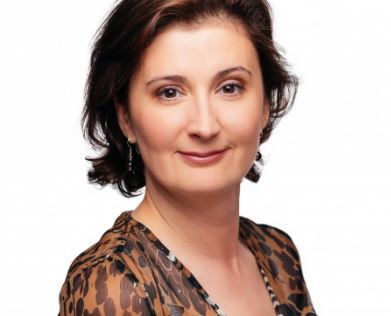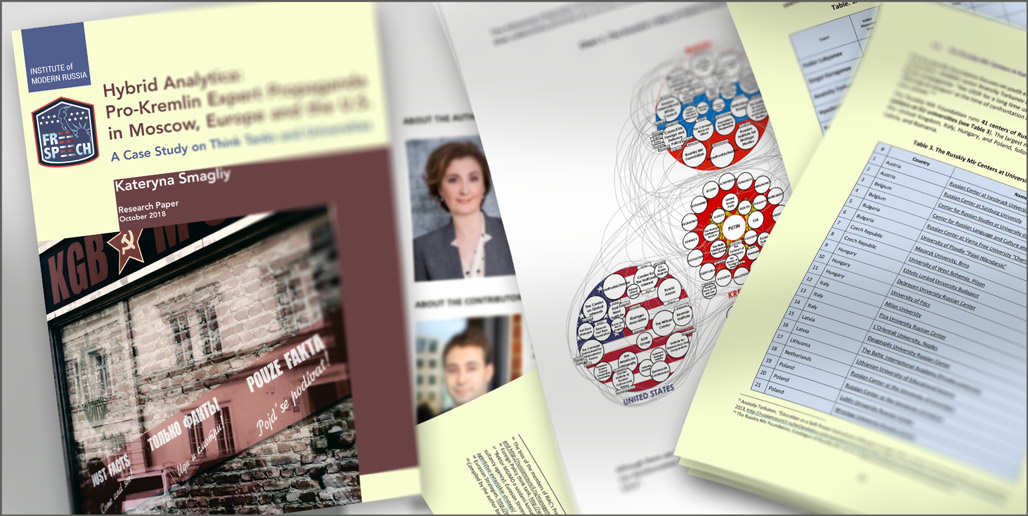With years, the Kremlin keeps increasing its efforts to exert its soft power tools and extensive networks in order to undermine the Western politics and media discourse. State funding of the Russian propaganda machine increases by around 30% annually, according to the report titled "Hybrid Analytica: Pro-Kremlin Expert Propaganda in Moscow, Europe and the US: A Case Study on Think Tanks and Universities" by Dr. Kateryna Smagliy, with a contribution from Ilya Zaslavskiy. The Institute of Modern Russia (IMR) published the study last October.

Hybrid analytica
According to the report, the Kremlin's "knowledge weaponization strategy" has five inter-related components.- The Kremlin engages domestic think tanks in the design of the communication strategies.
- It established influence centers abroad, operating as organizations of various types such as think tanks, academic Russian study and cultural centers, associations of Russian-speaking immigrants etc.
- The Kremlin uses private actors to promote its interests in the West.
- In information warfare, it relies on Russian intelligence and infiltrates other countries via the network of agents of influence.
- The mass media is used as multipliers, promoters and/or validators of pro-Kremlin narratives and messaging.

Findings
The report identifies how the Russian state-owned think tanks that are tied to the ruling elite preserve Putin's grip on power, developing policy recommendations for Russian state officials, public experts, and the media.The Russian state has infiltrated social and political debates in the West by opening its own Europe and US-based think tanks, such as the Dialogue for Civilizations Institute in Berlin, the Institute for Democracy and Cooperation in Paris, and the Center of Global Interests in Washington D.C.
"At the background of Russia’s deteriorating relations with the West, they suddenly found themselves at the very heart of “track II diplomacy” efforts. Russia’s invitations to the Valdai Club, as well as its generosity and first-class hospitality, have proved hard to decline," reads the report.Such Russian actions have shaped the phenomenon of Putinverstehers - a growing number of the Western Putin supporters who often excuse their participation in Russian agitprop fora, saying “we must deal with them in order to understand them.”
Recommendations
The authors have developed a set of recommendations for Western governments, institutions, and civil society on combatting Russian hybrid analytica.According to the paper, the Western governments should officially acknowledge the threat posed by Russia’s information warfare and re-focus financial support for Russia-related academic programs "from culture and history to in-depth analysis of Russia’s authoritarianism, kleptocracy and corrupt practices, such as state-sponsored propaganda and information warfare, militant foreign policy, violations of international law, and abuse of human rights."
Read the full text of the report "Hybrid Analytica: Pro-Kremlin Expert Propaganda in Moscow, Europe and the US: A Case Study on Think Tanks and Universities" on the website of the Institute of Modern Russia.
Read also:
- “Our disagreement with leadership’s pro-Kremlin tendencies ignored”: Ukrainian scholars on closure of Kennan Institute Kyiv office
- Democracies should prepare for the long fight against Russian disinformation warfare: study
- The Kremlin’s chaos strategy in Ukraine and its helpers
- Moscow outlined ‘information spetsnaz’ techniques over a decade ago, Shtepa says
- Academia again serves state ideology as Russia convicts Ukrainian library head
- How Russia infiltrates the media landscape of the Black Sea region
- How the Kremlin influences the West using Russian criminal groups in Europe
- Moscow has complex system to run agents of influence abroad, Khmelnytskyi says
- US indictment sheds light on the Russian troll factory instruction system
- How Russian Church serves Kremlin propaganda
- Kremlin think tank confirms close links with Kremlin and with new Greek premier
- Deception, Disinformation, and Doubt: Hybrid Warfare in Eastern Ukraine
- From objective reporting to myths and propaganda: The story of RIA Novosti
- Kremlin’s targeting of messages makes ‘ideology of hybrid war’ more effective and dangerous than Soviet predecessor, Eidman says
- How the Washington Times spreads Russian propaganda about Ukraine

